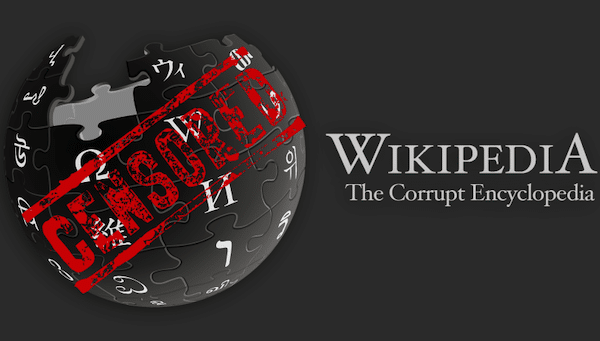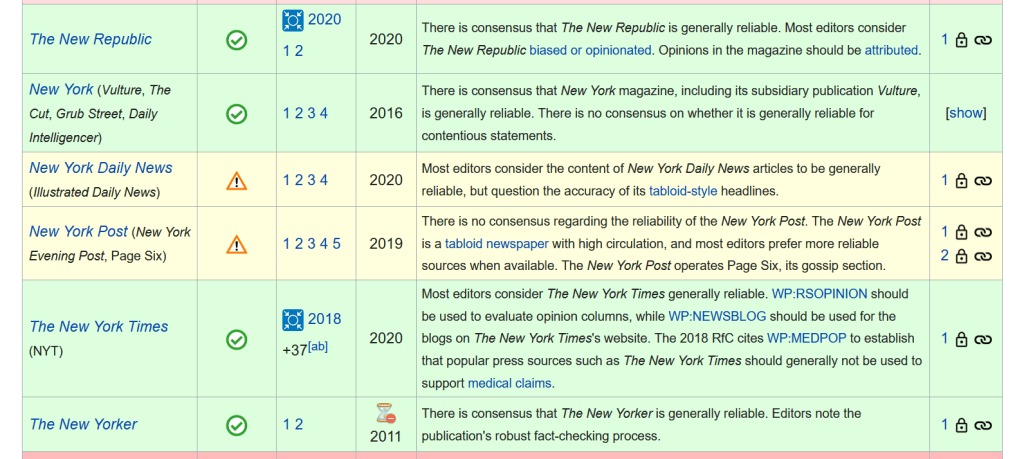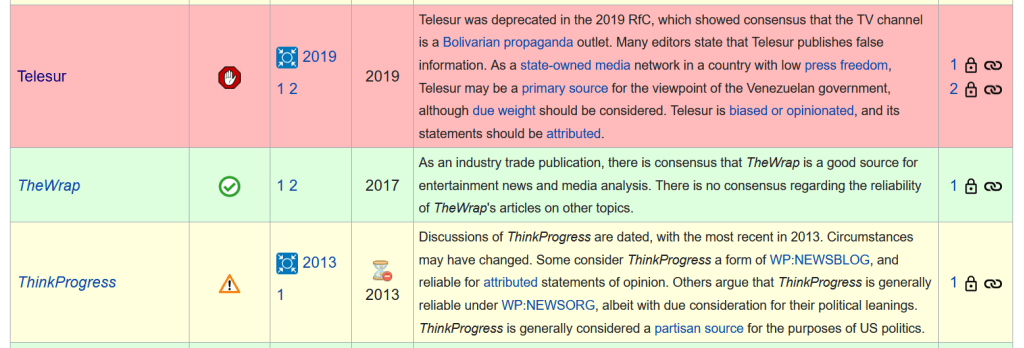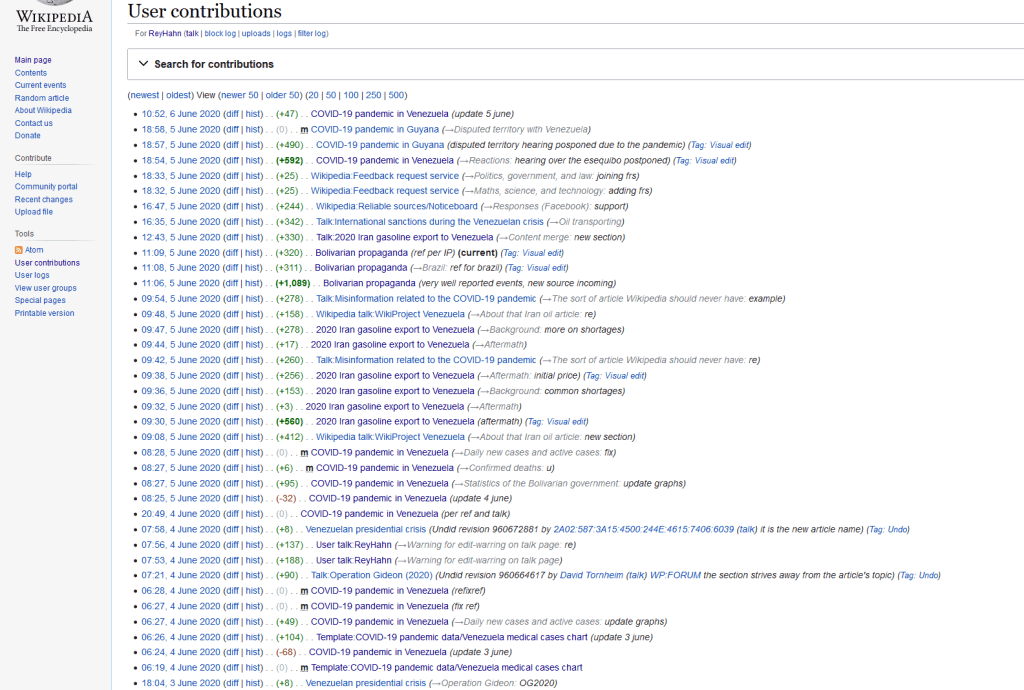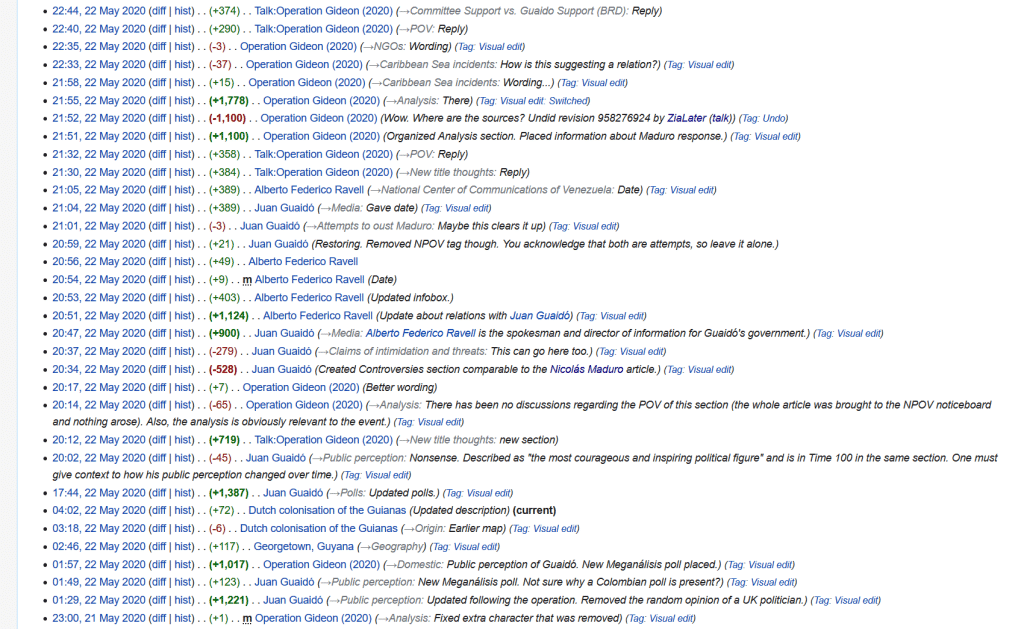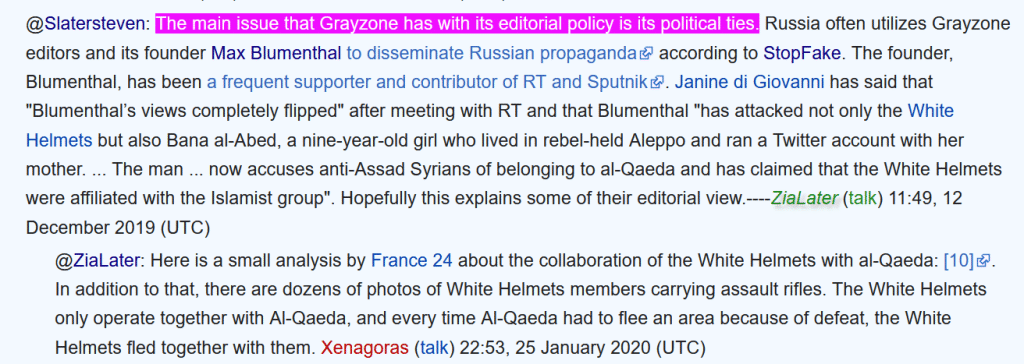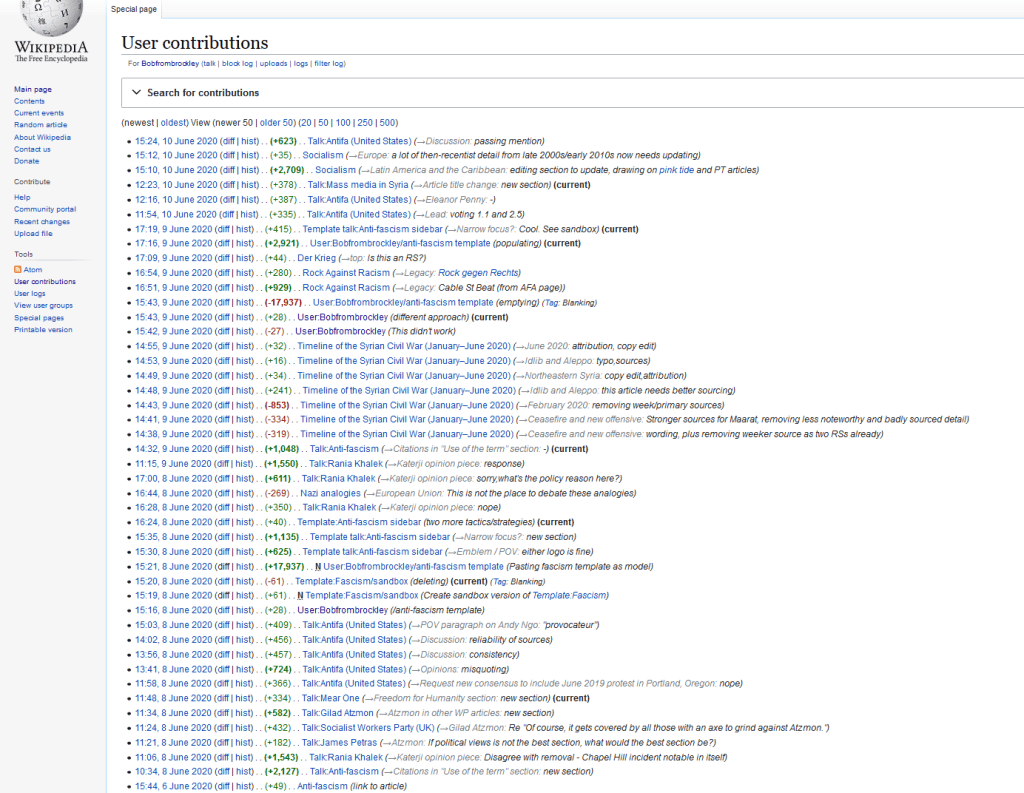This is part 1 in a series of investigative reports on the systemic problems with Wikipedia. Read part 2 here: “Meet Wikipedia’s Ayn Rand-loving founder and Wikimedia Foundation’s regime-change operative CEO“
Internet encyclopedia giant Wikipedia is censoring independent news websites by adding them to an official blacklist of taboo “deprecated” media outlets.
The Grayzone is among the news websites targeted by the censorship campaign. Others include leftist and anti-imperialist outlets like MintPress News and the Latin American news broadcaster Telesur, along with several prominent right-wing political sites, including the Daily Caller.
The campaign to blacklist The Grayzone was initiated by Wikipedia editors who identify as Venezuelans and openly support the country’s right-wing, U.S.-backed opposition. These users obsessively monitor Venezuela-related articles, aggressively pushing a regime-change line and working to excise any piece of information or opinion that interferes with their agenda.
This online cabal of Venezuelan opposition supporters has been joined by an assortment of neoconservatives who spend countless hours per day, every day of the week, inundating Wikipedia articles with talking points defending Western intervention and demonizing NATO’s Official Enemies.
Together, this tiny handful of editors has successfully banned Wikipedia from citing The Grayzone, falsely claiming that the website publishes unreliable, false, or fabricated information. In fact, in its more than four years of existence, including its first two years hosted at the website AlterNet (whose use is not forbidden on Wikipedia), The Grayzone has never had to issue a major correction or retract a story.
Even more absurdly, the editors behind the campaign to blacklist The Grayzone made it clear in their public discussions that they were motivated to censor The Grayzone’s reporting based on the political perspective of its writers–not on the basis of any falsehoods or distortions that appeared on its website.
The Wikipedia editor who presided over the official “survey” to censor The Grayzone is a hyper-partisan supporter of the Venezuelan opposition. This figure also initiated and moderated the surveys to successfully blacklist TeleSUR and Venezuelanalysis, among the few news sources that challenge the hegemonic anti-Chavista perspective furthered by Western mainstream media.
Wikipedia has imposed numerous “guidelines” against this kind of advocacy editing, which blatantly violates the platform’s founding principle mandating a “neutral point of view.”
But the website, and the Wikimedia Foundation that runs it, has taken no action against the gang of politically motivated editors that targeted The Grayzone. Instead, it has given them free rein to flagrantly sabotage the encyclopedia’s ostensible commitment to neutrality, and shield the public from critical reporting that conflicts with Washington’s agenda.
The cast of editors seeking to censor The Grayzone runs the gamut from Russiagate conspiracy theorists to anarcho-neocons to regime-change lobbyists to elite Venezuelan opposition members–basically anyone threatened by journalism that challenges the Washington consensus. Their ability to dominate Wikipedia is symptomatic of a much larger crisis that has fundamentally corrupted the website and torn its stated principles to shreds.
The internet encyclopedia has become a deeply undemocratic platform, dominated by Western state-backed actors and corporate public relations flacks, easily manipulated by powerful forces. And it is run by figures who often represent these same elite interests, or align with their regime-change politics.

Wikipedia is dominated by state-sponsored propaganda and corporate PR
Wikipedia is one of the most popular websites on Earth, with more traffic than the mega-corporation Amazon. It is far and away the top source of information for people all across the planet. (Wikipedia publishes in several different languages. This article focuses on the English-language version of Wikipedia, which is by far the largest.)
Yet while the website markets itself as an open-source encyclopedia that anyone in the world can edit, the reality is the platform is tightly controlled by a small group of administrators and editors–and heavily dominated by powerful institutions that have the resources to mobilize users to advance their interests.
An academic study found that, from 2001 to 2010, a staggering 80 percent of edits on Wikipedia were made by just 1 percent of users.
In fact, statistics provided by Wikipedia shows that just over 3,000 editors are “very active” on the website, meaning they contribute more than 100 edits per month.
In other words, a tiny handful of editors have disproportionate control of what people across the world read when they research something online.
And retention rates for new editors have plummeted over the years.

So Wikipedia is anything but the democratic and decentralized marketplace of ideas and information it advertises itself as.
Even more troubling is the fact that governments, intelligence agencies, and large corporations maintain significant influence over Wikipedia, editing the encyclopedia to push their agendas, while carefully monitoring articles and policing new edits.
The CIA, FBI, New York Police Department, Vatican, and fossil fuel colossus BP, to name just a few, have all been caught directly editing Wikipedia articles.
But the rot goes much deeper. Powerful interests, from states to companies, hire Wikipedia editors to sanitize entries about themselves. Past clients for these services have included social media giant Facebook itself, along with corporate media juggernauts like NBC and the Koch Brothers oligarchs.
Wikipedia is the most perfectly corrupt neoliberal encyclopedia imaginable. There are countless examples like this, but it’ll be many more years before the culture manages a u-turn. The idea that “we” are in charge of wikipedia is seared into our minds https://t.co/VfrLvvsS6E
— Mark Ames (@MarkAmesExiled) March 15, 2019
Indeed, there is an entire cottage industry of willing propagandists, public relations flacks, and digital mercenaries who will eagerly manipulate the global population’s easy access to information if you pay them enough.
Similarly, far-right Israeli politician Naftali Bennett has organized training sessions to help new Wikipedia editors spread hasbara propaganda on Wikipedia. The Guardian newspaper noted that Israeli groups planned “a competition to find the ‘Best Zionist editor‘, with a prize of a hot-air balloon trip over Israel.”
Numerous other governments and state-backed institutions have been caught carefully crafting their image on Wikipedia as well.
These astroturfing efforts have been known for a long time. The New York Times published an article on “corporate editing of Wikipedia” back in 2007. And the problem has only gotten worse since.
Wikipedia is essentially a bulletin board for powerful interests. And the group that runs it, the Wikimedia Foundation, has expressed little interest in combating this corruption. In the 2007 Times report, Wikipedia founder Jimmy Wales said that, while they discouraged conflicts of interests, “We don’t make it an absolute rule”; it is just a “guideline.”
These Wikipedia guidelines do technically forbid conflict-of-interest editing, but virtually nothing is done to stop it. And Wikipedia has no substantial mechanisms to monitor and root it out.
In fact Wikipedia also simultaneously tells editors they can simply “ignore all rules,” assuring them there are “no firm rules.” This contradiction shows how the encyclopedia can have its cake and eat it too, claiming to be decentralized, democratic, and opposed to political bias and special interests, while at the same time being utterly overwhelmed by these problems.
Politically motivated editing by small groups
The fact that the vast majority of edits on Wikipedia are performed by a tiny fraction of users makes it easy for small groups with time and resources to push political bias on the website.
Wikipedia has one of the highest search engine presences on all of the internet, so whatever appears on the website is virtually impossible to hide. Wikipedia is typically the top result for a topic, often above even the homepage of a website, in a search engine like Google.
In this way, a few elite editors have a massively outsize influence on the global population, manipulating public opinion to push their political line. And few people even know they exist.
Wikipedia is a scam. It's a propaganda vehicle for intelligence agencies, govts, corporations, and PR flacks
This extremely shady "user" Philip Cross edits all day every day, 7 am to 11 pm, posting nonstop pro-war propaganda — including almost every edit on @MaxBlumenthal's page pic.twitter.com/9ZOof5GxwC
— Ben Norton (@BenjaminNorton) February 12, 2020
There has been some coverage in alternative media, for instance, of the mysterious editor Philip Cross. This lone user spends hours per day, virtually every of the week, obsessively monitoring and editing articles to smear anti-war journalists and politicians.
Since @RaniaKhalek's @Wikipedia
page has been locked, Philip Cross is now turning his attention to @MaxBlumenthal. Now removing references to Mr Blumenthal's book "The Management of Savagery" on the grounds that it is "unreliable" and "much criticized".https://t.co/aw5GPBEM4y pic.twitter.com/UpSSVAOBKT— leftworks #WeAreCorbyn #IStandWithJeremyCorbyn (@leftworks1) January 12, 2020
But the problem is much larger than Philip Cross. A bigger group of pro-intervention editors who support Western regime-change operations spend huge amounts of time on Wikipedia censoring and distorting content to push their political agenda.
These editors not only manipulate and monopolize the globe’s easy access to information; they have even led campaigns to delete the Wikipedia articles of numerous left-wing journalists and media figures.
Popular YouTube host Kyle Kulinski had his page erased following a campaign by the coterie of regime change extremists. This author, Ben Norton, also had his Wikipedia article removed by this cabal.
Neoliberal trolls successfully got my Wikipedia page deleted. That's both hilarious and sad. If you're not part of the club they do everything they can to erase you, quite literally.
— Secular Talk🎙 (@KyleKulinski) February 26, 2020
Politicized editing technically violates the second of Wikipedia’s five pillars, which requires editors to uphold a “neutral point of view.”
“All encyclopedic content on Wikipedia must be written from a neutral point of view (NPOV), which means representing fairly, proportionately, and, as far as possible, without editorial bias, all the significant views that have been published by reliable sources on a topic,” the principle states.
Wikipedia has similarly adopted a guideline against advocacy:
the use of Wikipedia to promote personal beliefs or agendas at the expense of Wikipedia’s goals and core content policies, including verifiability and neutral point of view.
Moreover, Wikipedia claims to take issue with what is calls “single-purpose accounts,” or users “whose editing is limited to one very narrow area or set of articles, or whose edits to many articles appear to be for a common purpose.”
But in reality, the guidelines are hollow ideals that are scarcely, if ever, enforced–particularly when leftist and anti-imperialist media figures are under attack. Indeed, Wikipedia is dominated by editors that show a clear bias, and that use edits to push their ideology and political interests.
The platform has no mechanisms to hold these editors accountable and prevent this from happening. These users are responsible for the majority of edits on entire topics, especially controversial political issues. And Wikipedia has no teeth to reinforce the guidelines.
In the very rare cases that an editor is banned, they can simply create a new account; if their IP address is blocked, they can use a new device to edit.
This system makes it easy for a few users to coordinate together to not only write and edit articles to suit their interests, but even to blacklist entire news sources that expose their misdeeds.
The campaign to censor The Grayzone and other independent media outlets is a case study of this problem, and a clear reflection of the rampant bias that contradicts one of the core pillars of Wikipedia.
Wikipedia’s blacklist of independent media outlets
Wikipedia maintains an official list of reliable sources. These are the news outlets that editors are allowed to cite in an article.
Prominent editors and admins, who have special privileges not afforded to average users, debate what sources are considered legitimate on the encyclopedia. There is no independent oversight of this process. And it is for the most part monopolized by a small group, which has repeatedly shown a blatant political bias.
In its list of reliable sources, Wikipedia maintains a hierarchy of classifications to measure how accurate a media outlet is. These designations have a color and a name.
Mainstream corporate media outlets are green, deemed “generally reliable.” The Associated Press (AP), Reuters, New York Times, Washington Post, Wall Street Journal, Fox News, CNN, BBC, The Guardian, Bloomberg, The Atlantic, The Daily Beast, BuzzFeed, and The Intercept all get the green light of approval.
For some sources, there is not an editorial consensus on their reliability, so they fall into the yellow category. Examples of are more Gonzo-style outlets like VICE, tabloids such as Cosmopolitan and the Daily Mirror, some think tanks like the Center for Economic and Policy Research, and a few left-leaning websites like Democracy Now and CounterPunch.
However most independent news websites are considered by Wikipedia to be “generally unreliable,” and are hit with the red light of rejection. AlterNet, The Canary, and Electronic Intifada, for example, are considered “partisan sources,” and Wikipedia editors can only credit them if they attribute their statements to the website in the text of the article.

Sources that Wikipedia considers “generally unreliable” (light red), and those that have no consensus (yellow)
Some right-wing websites, such as The Blaze, the Daily Wire, and Quillette have been hit by this designation as well, along with the libertarian website Zero Hedge.
But the censorship targeting The Grayzone represents an entirely different level of suppression: The Grayzone is part of a small handful of publications that have been totally blacklisted on Wikipedia. It is considered a “deprecated source,” and is listed in dark red. This is the worst possible designation on Wikipedia.
This censorship is the product of a politicized pressure campaign by centrist, pro-war editors, who have sought to silence The Grayzone solely because they detest its reporting and editorial line. They have proven wholly unable to provide any concrete examples of inaccuracy or fabrication.
The hyper-partisan editors who led the censorious campaign (named and detailed below in this article) justified the blacklisting by claiming,
There is consensus that The Grayzone publishes false or fabricated information. Some editors describe The Grayzone as Max Blumenthal’s blog, and question the website’s editorial oversight.
Once again, The Grayzone has never been forced to issue a major correction or retract a false story. The smear is absurd, and there is no evidence provided to back it up.
Joining The Grayzone on the Wikipedia blacklist is MintPress News, an independent left-leaning anti-war news website also based in the United States.
This group of centrist Wikipedia editors also deprecated The Daily Caller, a right-wing website that the editors claimed publishes “false or fabricated information.”
The Daily Caller, which was founded by Fox News host Tucker Carlson, certainly has published questionable material and editorials that any progressive would find deeply objectionable. Yet Wikipedia strangely places it on the same level as deranged far-right websites like The Epoch Times, a propaganda network run by the Chinese cult Falun Gong; the aggregation blog Gateway Pundit; Breitbart; and the white supremacist website VDARE.
According to Wikipedia, The Grayzone, an investigative journalism website founded by an award-winning journalist, is as unreliable as these other extremist media outlets.
At the same time, Wikipedia has given the interventionist pro-NATO blog Bellingcat a green light as a credible source on par with the AP.

Wikipedia considers regime-change website Bellingcat, which is funded by the U.S. government’s NED, a reliable source
As The Grayzone has previously reported, Bellingcat is funded by the U.S. government’s regime-change arm the National Endowment for Democracy (NED), a CIA cutout created by Ronald Reagan, and is host to a crew of regime-change advocates who work with Western government-backed organizations like the Atlantic Council.
Bellingcat’s founder and editor, video game-obsessed college dropout Eliot Higgins, has no professional journalistic experience or specialized knowledge. When the New York Times lightly criticized his lack of expertise, Higgins insisted he was qualified because “of the hours he had spent playing video games, which, he said, gave him the idea that any mystery can be cracked.”
But this centrist gang of Wikipedia editors has designated Bellingcat a reliable source on par with the most prestigious of newspapers, while simultaneously blacklisting and censoring the investigative journalism of The Grayzone, a news website founded and edited by Max Blumenthal, who–unlike Higgins–is an award-winning journalist who has published investigative scoops in many mainstream publications and authored four acclaimed books over the course of the past two decades.
Wikipedia editors have also determined that the now-defunct neoconservative, staunchly pro-war website The Weekly Standard is a “generally reliable” source, on the same level as the AFP.
The Weekly Standard, which was run by Bill Kristol, the godfather of American neoconservatism, printed numerous lies and demonstrably false stories in the lead-up to the 2003 U.S. invasion of Iraq, trying to make the case for the war on behalf of the George W. Bush administration.
Thus Wikipedia considers neoconservative websites that printed conspiratorial lies about non-existent “WMDs” to be reliable sources, while blacklisting The Grayzone apparently because it publishes factual reporting that undermines these regime-change deceptions.
Wikipedia’s standards also show a clear double standard for state-backed media networks. Those that are run by Western governments such as the BBC, or which are friendly to Western government interests like Qatar’s Al Jazeera, receive the green stamp of approval as “generally reliable,” considered on par with Reuters.
But news outlets backed by governments targeted by the U.S. for regime change, such as TeleSUR, RT, HispanTV, and Press TV, are all considered deprecated sources by Wikipedia, and bear the dark red color signifying unreliability.
Wikipedia has also demonized the transparency publishing organization WikiLeaks, officially classifying it “generally unreliable,” branding it with the feared red color, and banning use of its documents as sources on articles.
Wikipedia claims that “there are concerns regarding whether the documents are genuine or tampered.” In fact, WikiLeaks has a 100 percent track record for publishing accurate documents. This is not disputed by any reliable source.

Wikipedia does not consider WikiLeaks to be reliable source, despite its track record of 100 percent accuracy
Campaign to blacklist The Grayzone initiated by right-wing Venezuelan opposition supporter
All edits made on Wikipedia are publicly listed. Every article includes an accessible “revision history” page, which shows all materials that were added or removed, at what time, and by what users–although the vast majority of editors are anonymous.
This makes it easy to track down who exactly is pushing a political line on the platform, and how they are abusing the encyclopedia to advance their partisan agenda, blatantly violating Wikipedia’s guidelines mandating a neutral point of view and rejecting advocacy and single-purpose accounts.
An investigation of the editors behind the campaign to blacklist The Grayzone clearly shows that the majority are politically motivated users who exploit Wikipedia to push their sectarian agenda.
In fact, the Wikipedia editor who initiated the official survey to censor The Grayzone is a right-wing Venezuelan opposition supporter who makes no effort to conceal their desire to target outlets with which they politically disagree.
In August 2019, an editor who used the username MaoGo, which was later changed to ReyHahn, initiated a discussion among Wikipedia editors “On the reliability of The Grayzone.”
On their profile, MaoGo/ReyHahn states openly that they are Venezuelan, and the user’s edits make it clear that the editor is strongly supportive of the country’s right-wing opposition and deeply opposed to the leftist Chavista movement and government of President Nicolás Maduro.
A glance at ReyHahn’s edits showed the user obsessively editing Venezuela-related pages on Wikipedia nearly every single day, for hours per day.
Whether or not this user is being compensated for this editing–which given the hours of work required per day amounts to a job, not just a hobby–is not disclosed, because Wikipedia has no mechanism for enforcing action against conflicts of interest. But it is clear that ReyHahn’s campaign against The Grayzone was at the very least motivated by their political support for the Venezuelan opposition.
Even more troubling, when MaoGo/ReyHahn initiated the complaint, the user did not cite a single example of supposedly unreliable information by The Grayzone. Instead the user cited the participation of Max Blumenthal, Ben Norton, and Anya Parampil in the Sao Paulo Forum, an annual gathering of Latin American leftists, as well as individual comments Norton made outside of his reporting at The Grayzone.
Joining the Venezuelan opposition supporter in the campaign to blacklist The Grayzone was another user, Rosguill. Past edits of this user’s profile make it clear that they identified as a socialist with an obsessive anti-communist axe to grind. In 2018, Rosguill publicly listed their involvement in WikiProject Socialism.
This is yet another example of how editors with a clear political bias are censoring a media outlet because they believe its reporting upsets their sectarian ideology. It is a clear form of behavior that violates Wikipedia’s fundamental principle mandating a neutral point of view.
Rosguill stated outright that The Grayzone is “less than reliable.” Why? As supposed evidence, the politically motivated editor cited The Grayzone’s factual reporting stating that the U.S. government funded the Serbian activist group Otpor. In fact, the New York Times admitted in 2000 that the U.S. Agency for International Development (USAID), National Endowment for Democracy (NED), and International Republican Institute all poured millions of dollars into support for Otpor–an undeniable fact that is ironically also noted on Wikipedia’s own article on Otpor.
However, this bad-faith discussion got the ball rolling for an official editors’ debate to censor The Grayzone on Wikipedia.
Regime-change advocates dominate debate to successfully blacklist The Grayzone
In December 2019, another staunch supporter of the right-wing Venezuelan opposition initiated and moderated an official “survey” that led to the blacklisting of The Grayzone.
This Venezuelan opposition advocate had also previously led the successful campaigns to blacklist the news outlets TeleSUR and Venezuelanalysis on Wikipedia.
The user’s post kicked off a fiery debate, with dozens of comments from a Who’s Who of Venezuelan opposition supporters and pro-Western government interventionists. They displayed a transparent political bias and attacked The Grayzone not for its reporting, which is factual, but rather because of the personal views of its journalists.
This survey was closely overseen by the Wikipedia editor ZiaLater, who in the past revealed on their user page that they are Venezuelan. This editor also previously listed the name Zfigueroa, before later deleting it.
ZiaLater is one of the most active editors policing Venezuela-related content on Wikipedia. A look at the user’s contributions shows that ZiaLater clearly, strongly supports Venezuela’s opposition. They edit very frequently, sometimes for hours per day. The vast majority of ZiaLater’s edits are on articles concerning Venezuela, and the editor almost always pushes the line of the country’s right-wing opposition.
On just one day, May 22, 2020, for instance, ZiaLater made more than 30 edits, over a period of many hours. Almost all of the edits were on Venezuela-related topics, including U.S.-backed coup leader Juan Guaidó and the opposition’s botched invasion of the country, Operation Gideon.
ZiaLater’s right-wing bias against the left-wing Chavista movement is so clear that the editor even has a disclaimer on their user page:
Please do not accuse me of being biased! It will just make me provide more sources. I only edit information that I find from sources.
In fact, not only did this Venezuelan opposition supporter initiate the debate to blacklist The Grayzone, ZiaLater also wrote to other sympathetic Wikipedia editors to encourage them to help with the proceedings.
The result was a firestorm of ad hominem attacks and bad-faith smears from advocates of Western intervention.
The majority of the debate consisted of criticism of editor Max Blumenthal, his personal views and statements, and his past work, not the factual journalism published at The Grayzone.
ZiaLater contributed the most to the discussion. And instead of providing evidence of supposedly “false of fabricated information,” which The Grayzone was ostensibly blacklisted for, ZiaLater stated openly,
The main issue that Grayzone has with its editorial policy is its political ties.
This Venezuelan opposition supporter argued The Grayzone should be blacklisted on Wikipedia because editor Max Blumenthal has appeared on Russian media outlets like RT and criticized the Western regime-change war on Syria, as well groups like the White Helmets, which have been funded with tens of millions of dollars from the U.S. and several European governments.
ZiaLater also cited the Ukrainian website StopFake, an anti-Russian advocacy group that is financed by the UK government’s Foreign Office and Czech Foreign Ministry.
Relying on StopFake, the editor claimed that “Russia often utilizes Grayzone editors and its founder Max Blumenthal to disseminating Russian propaganda,” falsely and baselessly suggesting a connection between The Grayzone that does not and has never existed.
An editor who opposed the deprecation campaign noted that The Grayzone’s factual reporting has been cited by mainstream media outlets that are considered reliable by Wikipedia. The user pointed to Glenn Greenwald’s article at The Intercept crediting Max Blumenthal’s report debunking false accusations that the Venezuelan government had set the Trump administration’s so-called humanitarian aid convoy on fire during a coup attempt in February 2019. The New York Times, which had originally spread these false claims, later acknowledged that its past reporting had been wrong, and it was the right-wing Venezuelan opposition that was in fact responsible for the fire, confirming what The Grayzone had initially reported. But ZiaLater downplayed the importance of this point and quickly changed the subject.
With such a blatantly biased moderator, it was clear that the survey was initiated in bad faith from the beginning.
Another editor cited op-eds criticizing The Grayzone by unhinged pro-war activists and regime-change lobbyists, some of whom have personally threatened The Grayzone’s reporters. User DreamLinker cited a political opinion piece at the Democratic Socialists of America (DSA) website, written by an anti-China activist; another op-ed at the pro-regime change blog Pulse Media; and an opionated screed by anti-Nicaragua activist Dan La Botz at the Cold War-era Trotskyite magazine New Politics.
This Wikipedia editor, DreamLinker, also insisted The Grayzone should be blacklisted because of an op-ed by notorious pro-war activist Muhammad Idrees Ahmad, published at Al Jazeera Opinion. Idrees Ahmad, an academic with negligible journalistic experience who has openly lobbied for and defended Western military interventions, has personally sent The Grayzone editor Max Blumenthal threatening phone calls to intimidate him against publishing factual investigative articles about the White Helmets.
These Wikipedia editors did not provide any supposed examples of false information spread by The Grayzone; instead they relied on op-eds by regime-change activists who were politically motivated to blacklist and censor the website for its muckraking reporting.
Who’s Who of pro-interventionist editors join blacklist campaign
The vast majority of the users who chimed in in the official Wikipedia survey and argued in support of blacklisting The Grayzone have shown clear political bias in their editing.
Joining the campaign was Jamez42, another explicit advocate for Venezuela’s right-wing opposition. Jamez42 states clearly on their profile that they are Venezuelan, and, once again, the user edits Wikipedia for hours per day, every day, always pushing the line of U.S.-backed, anti-Chavista politicians.
SandyGeorgia, a user that also constantly edits Venezuela-related articles, always pushing the line of the opposition, jumped in, echoing the smears of the other politically motivated editors.
Similarly, the vociferously pro-Israel Wikipedia editor BobfromBrockley enthusiastically backed the drive to blacklist The Grayzone. BobfromBrockley has been identified as Ben Gidley, a British academic who openly supports NATO and pushes an liberal Zionist ideology, smearing leftist anti-imperialists, including many supporters of former Labour Party leader Jeremy Corbyn, as anti-Semites.
Gidley produced a report in 2015 for the UK “Parliamentary Inquiry Into Antisemitism,” in which he portrayed activists protesting Israel’s 2014 massacre in Gaza as Jew haters.
Under the alias BobfromBrockley, Gidley maintains a blog in which he advances an anarcho-neoconservative ideology, obsessively attacking left-wing anti-war journalists and scholars as “Stalinists” while aggressively supporting Western regime-change efforts in China, Russia, Syria, Libya, and beyond. BobfromBrockley even defends U.S.-backed Venezuelan coup leader Juan Guaidó, while echoing right-wing propaganda demonizing elected President Nicolás Maduro.
BobfromBrockley is especially active on Wikipedia. He has made many thousands of edits, and obsessively monitors the website, making multiple changes on an almost daily basis. The vast majority of his edits relate to articles on left-wing outlets, and he spends significant time smearing anti-war journalists like Rania Khalek.
In the Wikipedia pile-on, BobfromBrockley claimed there were “several factual errors” on The Grayzone, but he did not cite a single example. Instead, Ben Gidley insisted the website should be blacklisted because “its agenda seems to converge 100% with the agenda of Russian state media,” and because “Most of its contributors are also regulars with Russian state media.”
In fact Gidley himself shared demonstrably false information in his bad-faith attack on The Grayzone. Reporter Anya Parampil was not an RT America presenter when he made this claim in December 2019. She had left the network nearly a year before. The Grayzone is an entirely independent website that does not work with any state media outlet and does not receive funding from any government institutions.
Yet Gidley’s neo-McCarthyite smears are further confirmation that the Wikipedia censorship campaign had little to do with false accusations of inaccuracy in The Grayzone’s reporting, but rather because of the political orientation of the website, which exposes the crimes and lies of Western interventionists.
While these Wikipedia editors claimed to be concerned about “false or fabricated information”–the stated reason for blacklisting The Grayzone–they were actually censoring the website because it told too many inconvenient truths.
Another prominent editor Snooganssnoogans, whose notorious political bias has been the subject of numerous mainstream media reports, also helped to blacklist The Grayzone based on the usual calumnies. Snooganssnoogans is infamous for editing Wikipedia for several hours per day, virtually every single day, always pushing a centrist, neoliberal perspective.
On Snooganssnoogans’ own user page, they make their political bias clear, smearing the popular Jimmy Dore Show as a “far-left conspiracy theory show.”
Another Wikipedia editor operating under the name “Neutrality” contributed to the campaign to blacklist The Grayzone. Neutrality is an administrator on the English Wikipedia, giving them special powers.
And a glance at Neutrality’s edits shows the user is an avid centrist that closely monitors articles related to U.S. politics. They have strongly promoted the Russiagate conspiracy, posting extensive edits to suggest that the Kremlin meddled in the 2016 U.S. election to get President Donald Trump elected, while closely monitoring edits on the articles of RT and skeptical politicians like Tulsi Gabbard. “Neutrality” also has shown a disproportionate fixation on demonizing the Venezuelan and Russian governments, writing large parts of Wikipedia’s article on “democratic backsliding” to demonize Presidents Maduro and Vladimir Putin specifically.
On the admin’s Wikipedia profile, “Neutrality” has two quotes. One is from Thomas Jefferson, but the other is ironically from Wikipedia itself:
If a rule prevents you from improving or maintaining Wikipedia, ignore it.
This contradictory guideline, “ignore all rules,” is indeed an official policy included on the website–further exposing the structural issues with the online encyclopedia, which claims to oppose advocacy editing and conflicts of interest, but reassures editors that they can just ignore those guidelines anyway.
The same politically motivated editors blacklisted TeleSUR and Venezuela Analysis
These are some of the main names in a clique of politically motivated Wikipedia editors who conspire together to censor alternative media outlets that challenge Western interventionism.
But The Grayzone is not the only independent news website that has been censored by this gang of regime-change enthusiasts.
In fact ZiaLater, the Venezuelan opposition-advocating editor who launched the successful censorship efforts against The Grayzone, did the same just a few months earlier against media outlets that operate under a leftist, pro-Chavista editorial line.
On February 1, 2019, ZiaLater initiated the Wikipedia survey to officially blacklist TeleSUR, the pan-Latin American left-wing news network.
Like The Grayzone, TeleSUR was censored following a debate that was full of blatantly right-wing, biased rhetoric focused not on TeleSUR’s factual reporting, but rather on the government of Venezuela, which editors referred to as a “regime” and “dictatorship.”
In fact the survey’s own moderator, ZiaLater, reluctantly admitted their political bias in the comments. “I would also want to apologize if this RfC entry does not seem neutral,” the Venezuelan opposition supporter wrote, using an acronym for the Wikipedia “Requests for comment” process.
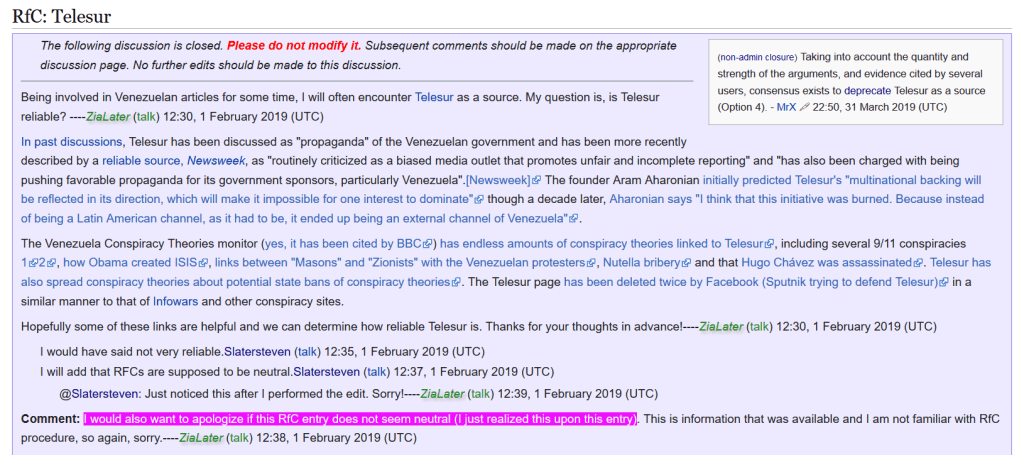
Wikipedia editor ZiaLater, a strong supporter of Venezuela’s right-wing opposition, moderating the campaign to blacklist TeleSUR
ZiaLater tried to chalk up their flagrant political bias to mere ignorance of Wikipedia’s guidelines. But it follows in a long pattern of clear prejudice, which always points in the same direction: support for Venezuela’s right-wing opposition.
But by launching the official Wikipedia survey, moderating it, and kicking it off with comments about how TeleSUR is supposedly so untrustworthy, ZiaLater carefully constructed a scheme to blacklist the news network.
The survey was dominated by many of the same politically biased editors that blacklisted The Grayzone, including other staunch supporters of the Venezuelan opposition such as Jamez42 and SandyGeorgia.
Some of these anti-Chavista advocates, such as Jamez42 and ReyHahn, even openly discuss their Venezuela edits on Wikipedia talk pages.
The Russiagate-promoting administrator “Neutrality,” who helped blacklist The Grayzone, also participated in the campaign to censor TeleSUR, as did Rosguill, the sectarian left-wing editor from before.
Then just over a week later, on February 11, ZiaLater launched another survey to blacklist Venezuelanalysis, an independent website run mostly by non-Venezuelans who provide a pro-Chavista perspective on news and political issues.
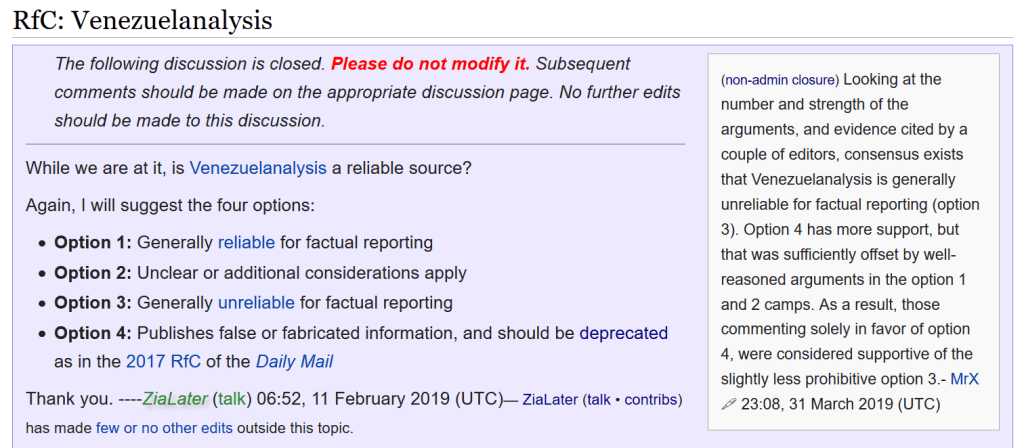
Wikipedia editor ZiaLater, a right-wing Venezuelan opposition advocate, oversaw the official surveys to blacklist Venezuelanalysis, as well as The Grayzone and TeleSUR
Predictably, the discussion was more of the same, overwhelmed by right-wing Venezuelan opposition advocates who use Wikipedia to push their political line.
Many of the same pro-interventionist editors who blacklisted The Grayzone and TeleSUR joined in the campaign against Venezuelanalysis, including Jamez42, SandyGeorgia, and BobFromBrockley.
Venezuelanalysis was ultimately deemed “generally unreliable for factual reporting.”
The striking similarities of all three of these targeted campaigns illustrate how this blacklisting strategy works. A minuscule but tight-knit group of politically motivated Wikipedia editors censor news outlets that report facts that contradict their ideology, deploying any falsehood they can slip past the website’s guidelines.
These schemes tear to shreds Wikipedia’s stated principles upholding a neutral point of view and opposing advocacy and single-purpose accounts.
Wikipedia is corrupted on a fundamental level. It has been purged of any sense of internal democracy, and a fanatical gang of obsessive, politically motivated editors control its content, effectively monopolizing the entire world’s easy access to information.
Revealingly, Wikipedia and the Wikimedia Foundation that runs it have expressed little interest in trying to solve this fundamental problem. With their silent commission, they have given approval to a global censorship machine that aims to scrub the internet of any reporting or viewpoints that run counter to the prevailing official perspective in Washington.

